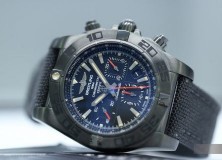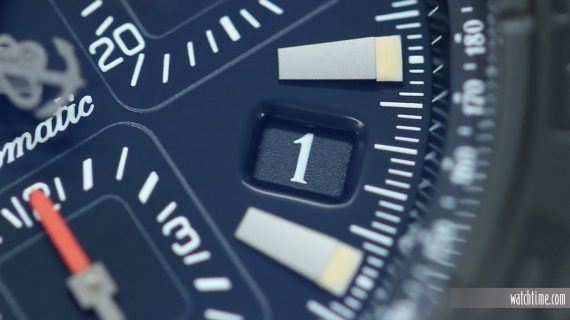Breitling introduced its first “Blacksteel” watches in 2012, and in the years since the brand renowned for its aviation roots has launched a veritable fleet of such timepieces. Nearly every one of its watch families now offers at least one model with the Blacksteel treatment, including versions of the Navitimer, Navitimer Cosmonaute, Colt, Avenger II, Super Avenger, and Avenger Sea Wolf.
Blacksteel’s appearance has always been very admirable, and now finally have the opportunity to wear one of these works in recent weeks. Better yet, the evaluation model I received from one of the most iconic and historically significant collections of Chronomat, the big-but-not-oversized 44-mm version.
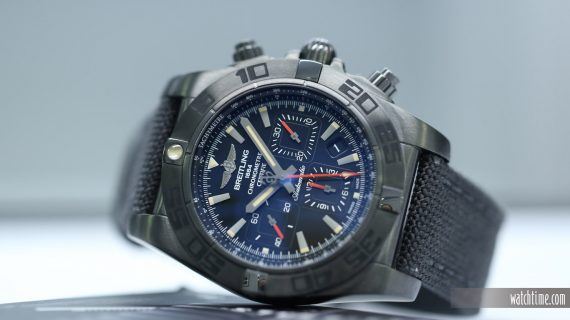
By way of background, the modern version of the Breitling Chronomat debuted in 1984, the 100th anniversary of the founding of the Breitling company. It was a descendant of one of Breitling’s most significant milestone timepieces, the original Chronomat, which debuted in 1941 and featured the now-famous circular slide rule bezel, a common element of today’s Breitling Navitimer watches, though not one present on today’s Chronomats. The 1984 revamped version introduced the hallmark “rider tabs” at 12, 3, 6, and 9 o’clock on the unidirectional ratcheting bezel. And while I do appreciate the Navitimer in its many versions, one of the aspects I like about the Chronomat is the relative simplicity of its tricompax dial in comparison to the “busier” look of the Navitimer.
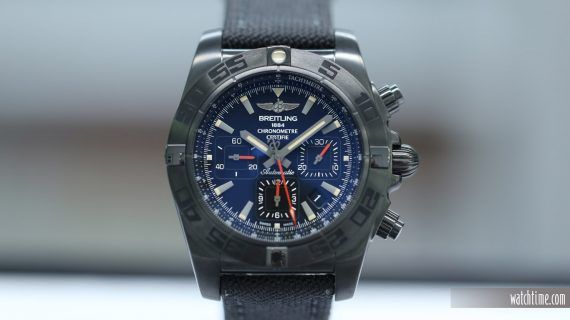
The case is pure Breitling — masculine and martial, measuring 44 mm in diameter and 16.95 mm thick. In profile, from the side with the screw-down crown and chronograph pushers, it projects an imposing look; if you squint and use your imagination, it almost resembles artillery pointing outward. Of course, this is thanks to the smooth, “invisible” finish of the blacksteel part of the case, which sparkles in some of the lighting guns.
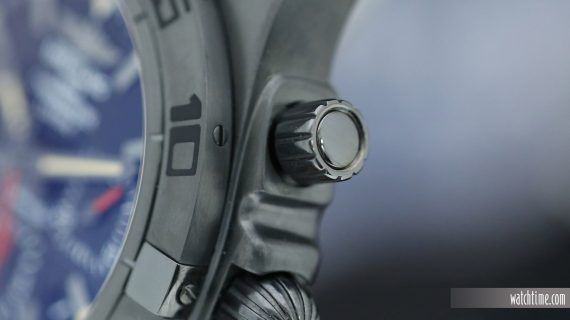
Somewhat oddly for such an aviation-inspired watch, the bezel ratchets in one direction, as on a divers’ watch, rather than both, which would be more utilitarian for a pilot — though it’s not like I was planning on getting into a cockpit with the watch anyway. The rider tabs — as touted by the brand — do indeed make the bezel easier to grip and to turn. The tab at 12 o’clock has an inset dot filled with the same khaki-colored Super-LumiNova as the hands and indices, so it’s easy to figure out in the dark how to reset the bezel to zero. Rotating the bezel quickly produces a pleasant buzzing, made up of multiple clicks, that brings to mind a tiny motor. The stencil-type, Arabic numerals on the bezel, which mark the five-minute intervals between the rider tabs, are another nice military touch; inlaid in black rubber, they also provide a tactile treat as you run a finger over the bezel’s surface. Attention-to-detail alert: a tiny, cursive “B” for Breitling appears on the side surface of the bezel, subtly etched between 11:55 and 12 o’clock.
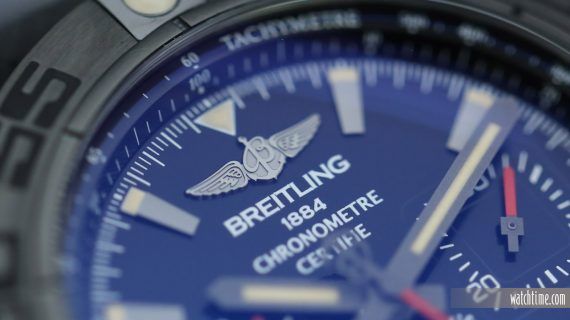
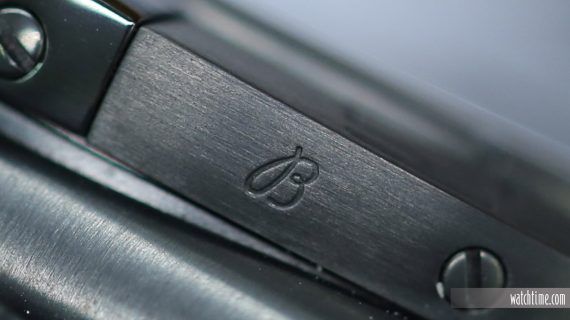
The black dial picks up the case of the military tool-watch character. The dial is surrounded by a white tachymetric scale printed on the flange. The hour and minute hand, as well as the edges of the applied hour indices, are treated with khaki-colored Super-LumiNova (which actually glows green in the dark). Bright red is used for the central chronograph seconds hand as well as all of the subdial hands (running seconds at 9 o’clock, 30 elapsed chronograph minutes at 3 o’clock, and 12 elapsed chronograph hours at 6 o’clock). The red-on-black contrast is helpful in reading the subdials’ readouts, as the numerals are tiny and otherwise somewhat challenging for the naked eye to read with precision.
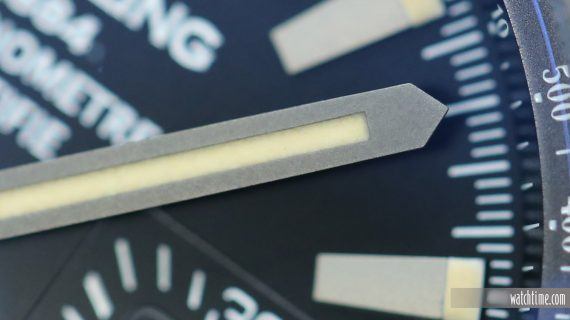
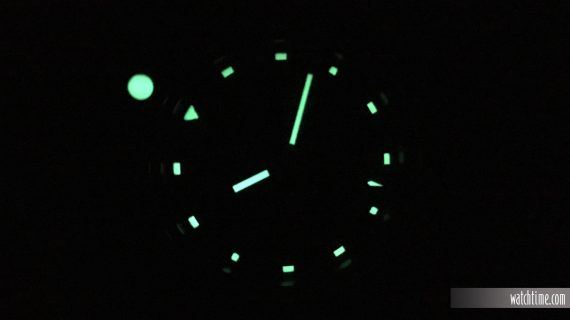
About those subdials: they are square-shaped (or at least cushion-shaped) for no practical reason I can discern, but somehow they work aesthetically, adding a bit of visual interest to the dial, and subtly picking up the blocky shapes of the bezel numerals and rider tabs. Breitling’s “winged B” logo soars below the triangular index at 12 o’clock, while the brand’s “anchor B” emblem forms the counterweight of the chronograph seconds hand.
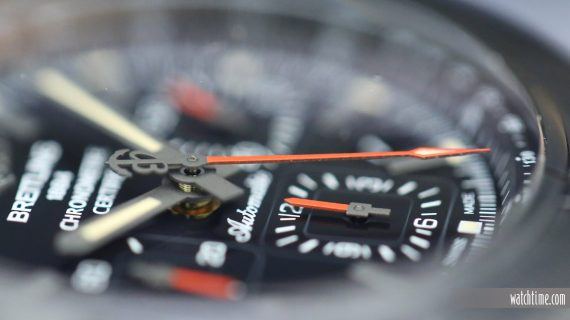
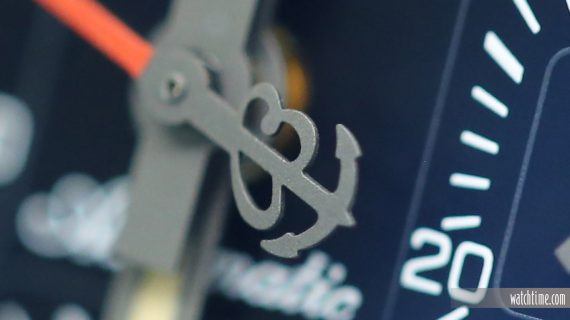
As a watch full of anticipation, the Crown, divided by the steel trough and the security guard, the screw safely. The chronograph pushers on either side of the crown also have a security feature: screw-down rings that need to be manually loosened before the pusher can be operated to start, stop, and zero the chronograph. This may seem an inconvenience at first, but it is easy enough to simply leave both pusher rings unscrewed if you will be using the stopwatch, especially for timing multiple events, for an extended period of time. Also, the pusher rings are surprisingly easy to unscrew even while the watch is on the wrist — a consequence, surely, of the case’s relatively thick profile, which means the pushers are not too close to the wrist, leaving the fingers room to maneuver.
Sapphire window caseback gives enough view to view the movement, Spirit’s internal caliber 01. Mechanical vista by large, black winding rotor, mounted on a circular wave pattern and a carved spirit mark. The rotor ties together the watch’s overall monochrome-black look nicely. Other haute horlogerie decorations include côtes de Genève, snailing, and diamond-polished bevels. The movement is a COSC-certified chronometer; I didn’t expect timekeeping reliability to be an issue with this watch, and it wasn’t. What really shouldn’t be overlooked among this movement’s attributes is the 70-hour power reserve, a 28-hour improvement over that of the ETA Valjoux 7750 movements that powered earlier iterations of the Chronomat.
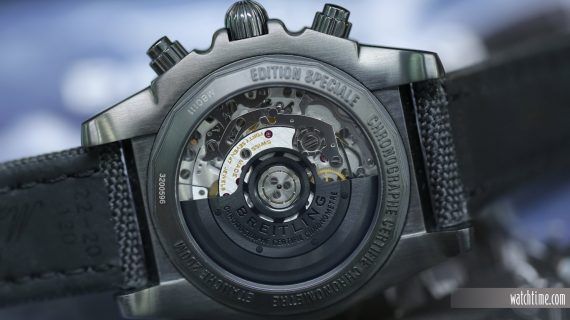
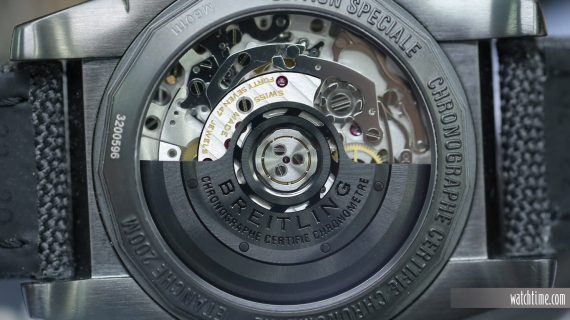
Breitling refers to the strap as “military rubber,” which seems to be essentially a black rubber base overstitched with some kind of suitably gritty, sturdy black textile. It is definitely a rough-and-ready military aviator look, with a tang buckle made of Blacksteel and engraved with Breitling’s winged logo. It makes the watch very comfortable on the wrist, even though it’s a look more compatible with casual wear than with formal wear. (But hey, it’s still a Breitling; no one’s going to quibble if you wear this watch with a dark suit.)
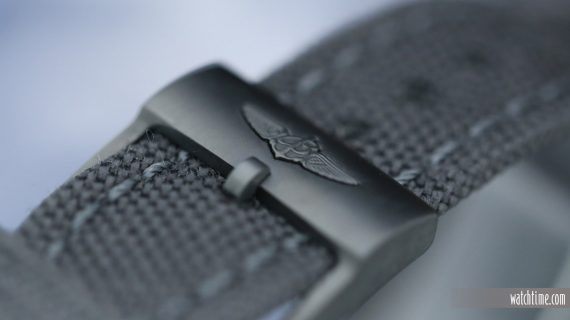
In summary, and to squeeze in one more tortured aviation metaphor — my test flight of the Breitling Chronomat 44 Blacksteel left me wanting more time at its controls. The watch is available at Breitling boutiques and other select retailers for $9,720.
